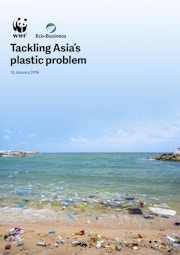
Ban, tax, recycle or redesign? What can Asia do to fight one of the toughest environmental challenges of our time?
Just five Asian countries—China, Thailand, Indonesia, Vietnam and the Philippines—contribute to more than half of the world’s plastic pollution. Can this region find a solution to its most talked about environmental crisis?
Plastic finally seeped into the consumer consciousness in 2017 when it emerged that the petroleum-derived commodity, used to make everything from cigarette lighters to drinking straws, now contaminates our tap water and the air that we breathe.
At a closed-door event hosted by Eco-Business and green group World Wide Fund for Nature (WWF) in Singapore on 12 January, 20 government, business and civic society leaders debated how to tackle a problem that has overwhelmed countries with consumer economies that have outgrown their ability to manage waste.
Participants included representatives from Singapore’s National Environment Agency, Coca-Cola, Tetra Pak, Unilever, Food Panda, RedMart, Sealed Air, Marina Bay Sands, Zero Waste SG, Singapore Environment Council and Ocean Recovery Alliance.
Publish your content with EB Premium
It's not about how many you reach. It's about who. Get your news, events, jobs and thought leadership seen by those who matter to you.

















